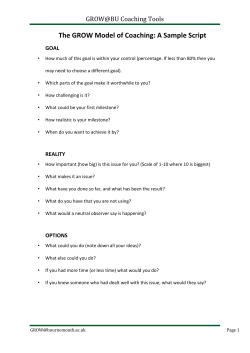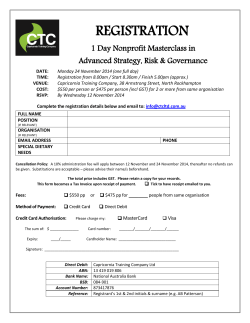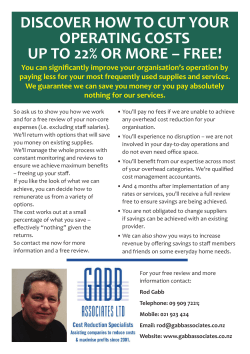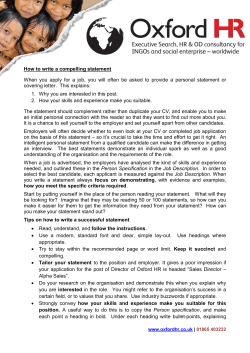
Building Teams Gill Bailey Management
Building Teams Gill Bailey Management Trainer Learning Outcomes Understand the • Power of a Team • Team climate • Team Roles • Team Leadership • Team Problem solving Together Everyone Achieves More Why work in Teams ORGANISATION MEMBERS • • • • • • • • • • Collaboration Communication Commitment Realism of objectives Establishing a pace Accountability Trust Creativity Strategic thinking Broader perspective Team Characteristics • Functional teams – management role defined • Formal program teams – established for a goal and lifecycle • Informal program teams – established for problem solving • Ongoing work teams – self-directed work teams – popular format Agreeing Team Objectives •Goal •SMART objectives •Lifecycle Celebrating Team Success •Identify areas •Team discussion •Agree benefits •Celebrate •Publicise Setting the Team Climate Shared • Purpose • Vision Organisational • Rules • Performance development system • Communication Building • Morale • Trust Key Factors Organisation commitment Communication Review success factors Reward & recognition Dealing with conflict Conflict of: ideas, aims, attitude, behaviour Occurs at Stages: 1. Initial anger or frustration 2. The problem and outcome required 3. Implementation of plan 4. Reaching a result Be aware of individual reactions • Meet individuals • Explore feelings • Explore alternative view • Gain agreement to progress plan • At result stage refer to benefits and provide feedback High Performing Teams Key factors: •Co-ordination •Communication •Conflict Resolution •Meeting Quality •Participation •Planning •Objectives and Expectations •Problem Solving •Facilitation •Representation of the Team to the Organisation •Feedback •Follow-up Recruiting into teams Team member • Roles • Skills & Experience • Availability • Behaviours • Values • Commitment Personality theories & tests Carl Jungs theories – extrovert and introvert Thinking, feeling, sensation, intuition MBTI Testing Identifying Team Roles Roles e.g. Belbin Team Roles: Co-ordinator Shaper Plant - creator Monitor evaluator - analyst Implementer Resource Investigator Team worker Complete-finisher Specialist Not by functions Matching individual personalities, skills and experience Interdependence Scale of Team Interdependence Group 1 5 10 Team e.g. Basketball Hockey Jazz Quartet Questions: Is this work group expected work as a team? Purpose? Why is the team working together? Where should this team be on the scale? Stages of Team Development 4. Performing -our ground rules, and processes are working -we work together, cooperate, & support each other -we are meeting our high standards of performance 3. Norming -we talk openly about our problems and issues -we set new “ground rules”, processes and procedures to resolve them 2. Storming -issues and irritations, problems surface, Infighting -we argue even when we agree -power issues “who’s in control” and “how is control exercised” 1. Forming -we are polite, we are cautious, we are trying to get organized -we ask ourselves, “How do I belong to this group” Team Management Style Role • Facilitate • Give direction and authority • Find needed resources • Resolve conflict • Performance management Leadership • Communication • Lead by example • Motivate to achieve • Lead discussions to resolve • Develop solutions • Gain consensus • Ensure critical decisions are taken • Monitor & recognition Developing Leadership Skills Develop trust and respect by: • Having integrity- honesty and morals • Being fair – treating the team equally • Being consistent – avoid ‘chopping & changing’ • Being dependable – avoid ‘false promises’ • Having respect for others – show interest in others, empathy and understanding, confidence in the team • Setting an example – set high standards and a good example Providing support Planned support • Skills Gap Analysis Reactive support • Direct request from team member • Response to problems or team activities Key Leadership Support roles: Co-ordinator – plan, organise, monitor Facilitator – support & encourage to achieve the task Coach – guidance & help, one to one John Adair Using Coaches and Mentors • One to one support from a professional coach or mentor • Company in-house or external professional Mentoring – ‘where one individual acts as a positive role model and adviser to another, drawing on personal experience and facilitating improved performance, learning or development’ Supporting People Theme - Mentoring Guide 2004/2005 Coaching - is ‘about self-awareness and personal confidence, about building leadership ability, and not just job knowledge. Not simply challenging people but encouraging people to challenge themselves’ ilm coaching survey, June 2011 Communication Methods • Probing • Listening • Open questions • Survey members • Feedback • Recognition Formal • Meetings – frequency. timing • Debate • Reach Agreement • Written – newsletter, email, letter • Visual – noticeboards • Verbal – phone, open door Most people spend more time and energy going around problems than in trying to solve them. Henry Ford Creative power of teams Exploring • Round robin • Brainstorming Gaining consensus • Listing by member vote • Position by Positive against base Win-win solutions 10 Win-Lose 10/0 Win-Win 10/10 Aim Your Needs Compromise 5/5 Lose-Win 0/10 0 My Needs 10 Summary • Power of a Team – characteristics, objectives • Team climate – factors, conflict, performance • Team Roles – attitude v experience, individuals, roles, interdependence • Team Leadership – team development, style, support, coaching & mentoring, communication • Team Problem solving – creativity, win-win "He Your Action Plan What will you take forward into your workplace? •Be SMART •Monitor •Review & recognition who wished to secure the good of others, has already secured his own." Confucius References Social Work Task Force, Building a safe, confident future, p 57. The Social Work Task Force (SWTF) recommended that organisations conduct a ‘health check’, looking at 5 key areas: 1 Effective workload management 2 Proactive workflow management 3 Having the right tools to do the job 4 A healthy workplace 5 Effective service delivery Skills for Care http://www.skillsforcare.org.u k/developing_skills/leaders hip_and_management/LM_ introduction.aspx Business http://www.businessballs.com /personalitystylesmodels.ht m Contact LinQs at Enquiries@linqs.co.uk or (+44)1200 442482 or visit LinQs website To develop your Registered Managers
© Copyright 2025









